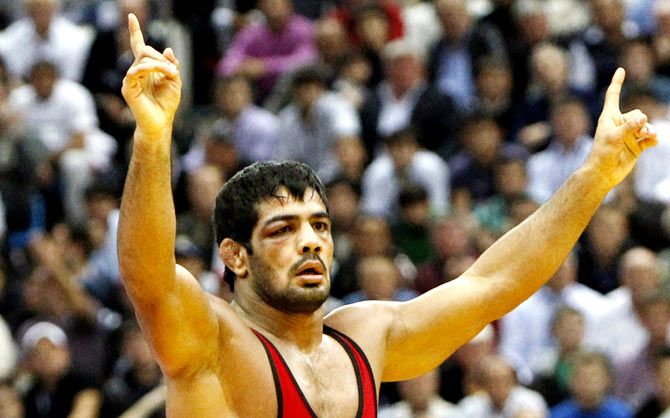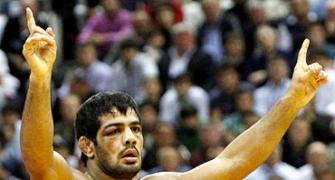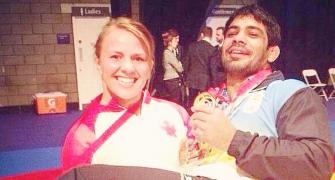There is a quiet air of confidence at the wrestling camp being held at Sonepat to prepare India's brightest wrestling prospects for the forthcoming Asian Games in Incheon.

As you enter the Chaudhary Devi Lal Northern Regional Sports Centre on the outskirts of Sonepat in Haryana, you are greeted by a massive billboard adorned by pictures of the country’s top wrestlers, beaming and proudly flashing the numerous medals they've won over the years. I head towards the wrestling centre at the academy, where 14 of India’s brightest male wrestlers, who will represent India at the Asian Games in Incheon later this month, are sweating it out.
The state-of-the-art arena, complete with six artificial mats, central air-conditioning and glistening LED lights, is the epicentre of the country’s wrestling revolution.
Inside the Sushil Kumar-Yogeshwar Dutt wrestling hall, named after arguably two of India’s greatest wrestlers, the rise of two phenomenal young men is palpable. As chief freestyle coach Vinod Kumar instructs the Indian wrestling team to begin their morning exercises, Amit Kumar and Bajrang Kumar are the first off the block. While the others struggle to keep up with them, both of them are hardly out of breath, going about their routine at breakneck speed. They lead the routine for the next half hour. The walls behind them are decorated with framed pictures of India’s wrestling greats, right from KD Jadhav to Sushil Kumar and Dutt. Very soon, when their idols walk into the sunset, these two 20-year-olds will take from them the baton of Indian wrestling.
As photojournalist Dalip Kumar moves in closer to get a shot of Amit Kumar, the steely gaze in the grappler’s eyes becomes more intense, and his exercise motion get visibly swifter. “Theek hai?” a thick accented voice asks him, in perfect Hindi. It is Vladimer Mestvirishvili, the team’s foreign expert. His response is typical of a 20-year old, “Photo ke liye karna padhta hai,” he says. On the mat, the young man from Nahri village in Sonepat is like a rattlesnake, lightning fast and impossible to quell. “I’m working on my speed. I’ll be up against wrestlers from Iran and South Korea at the Asian Games. You have to be really quick to beat them,” he says.
A few moments later, he injures his head in a fierce tangle with one of his teammates. Such is the tenacity of the man that a tiny piece of bandage on the head and five minutes later, he is raring to go again. The coaches ward him off, purely as a precautionary measure.
Meanwhile, Bajrang Kumar slogs it out even after practice has concluded, taking tips about his body positioning from Mestvirishvili. “There is too much pressure on your left thigh,” points out Mestvirishvili.
The young man immediately makes the correction. A native of Jhajjar in Haryana, Bajrang Kumar boasts of medals at the World, Commonwealth and Asian levels at such a young age. A silver medalist in the 61 kg category at the Glasgow Commonwealth Games last month, he hopes to go one better at the Asiad in Incheon.
“The competition in Incheon will be much tougher. But I’m working on the mistakes I made in Glasgow. Gold is definitely within reach,” he says.

While Amit Kumar considers Sushil Kumar as his hero, Bajrang Kumar models himself on Dutt. Such is the respect for his idol that he is ready to give up on the Rio De Janiero Olympics in 2016 if Dutt chooses to compete in his preferred 60-kg category. “He’s like my elder brother. He has taught me everything. There is no way I’ll be competing in the same category. I’ll wait for the Tokyo Games in 2020,” he says.
However, the catalyst that has brought them this far is the same. Sushil Kumar’s bronze at the 2008 Beijing Olympics changed their lives. That performance inspired a whole new generation, which included upcoming young wrestlers like the duo, itching to make their mark. “Sushil showed us that anything is possible. All of us wanted to become like him,” says Amit Kumar.
In order to keep fit, the boys maintain a strict diet and religiously adhere to their fixed sleep patterns. The traditional ghee has been replaced by imported food supplements, and protein shakes are now preferred to large glasses of plain milk. Lunch must be taken at 12.30 pm sharp, and nobody at the camp is allowed to stay up beyond 10 pm. “Ghee increases the fat content in your body. Its consumption makes it difficult to lose weight. Wrestlers in the mid-weight categories, in particular, choose to stay away from ghee,” says one of the coaches at the camp. A well-planned training schedule has been charted out for the squad. Two practice sessions are held every day, one at 7 in the morning, and the other at 5.30 in the evening.
Ask them about their preparation, and both Amit Kumar and Bajrang Kumar sound upbeat. They will compete in the 57-kg freestyle and 61-kg freestyle categories, respectively. India almost made a clean sweep on the mat at Glasgow, with 13 of the 14 wrestlers on show clinching medals. “Expecting a repeat would not be right. But we should win at least five gold medals,” says Vinod Kumar.
As the wrestlers hit the gym for some light exercises after a gruelling morning session, Amit Kumar tells us about living up to the pressures of being a top wrestler. "What Sushil and Yogeshwar have achieved is huge. We will try to keep performing at that level." As he tries to finish his sentence, assistant coach Virender Kumar snaps at him, "Trying is not enough, you will have to do it for your country." Following in the footsteps of their legendary predecessors will not be easy, but then, Amit Kumar and Bajrang Kumar are no ordinary talents.
Also watch out for...
Babita Kumari, 24, 55-kg women’s freestyle: In 2012, Kumari became only the second woman since Alka Tomar in 2006 to win a medal at the World Championships. She won a bronze in the 51-kg freestyle category in Edmonton, Canada. In Glasgow, the Bhiwani girl fought with a torn ligament in the final, but secured the gold medal in emphatic fashion. She is a strong contender for a medal in Incheon.
Pawan Kumar, 20, 86-kg men’s freestyle: The Delhi-born wrestler pulled off an amazing come-from-behind win against Pakistan's Muhammad Inam to clinch a bronze in the 86-kg freestyle in Glasgow. Although new to the international circuit, his performance then was enough proof of his enormous potential.
Satyawart Kadian, 20, 97-kg men’s freestyle: In Glasgow, gold evaded the Rohtak boy by a whisker as he lost to Canada's Arjun Gill in the final. In Incheon, the Indian coaches are hopeful of a gold medal in Incheon.
His main rivals will include grapplers from Iran, Kazakhstan and South Korea.










